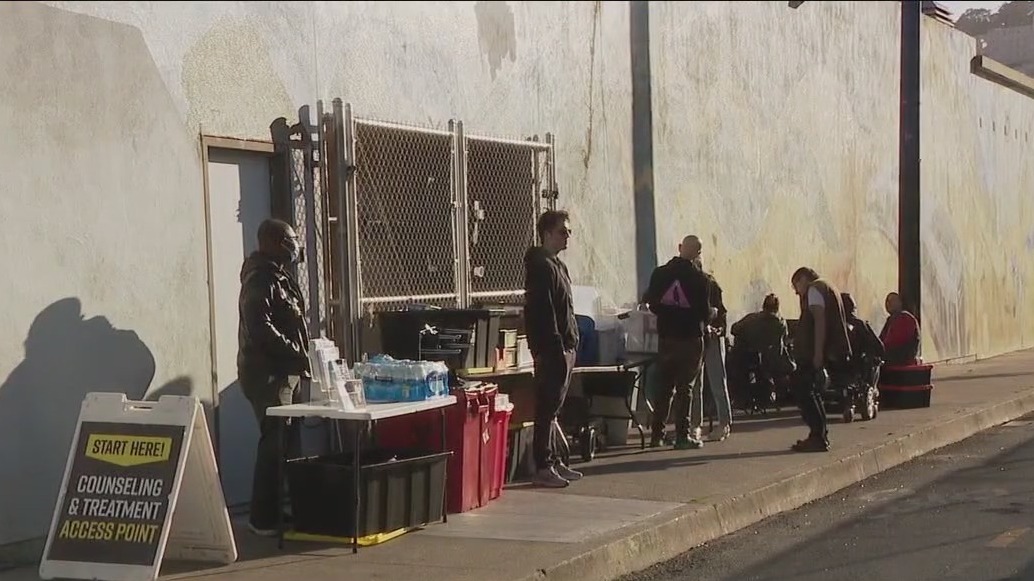San Francisco mayor's harm reduction overhaul gets mixed reaction

Mixed reviews for Mayor Lurie’s new harm reduction policy in San Francisco
San Francisco’s new harm reduction policy is prompting mixed reactions, as city-funded programs now must offer counseling alongside supplies and restrict public distribution of smoking materials under Mayor Lurie’s directive.
SAN FRANCISCO - More than six weeks after a new city policy overhauling harm-reduction services took effect, community members and participants are offering mixed reviews about how it’s playing out on the streets.
The policy is part of Mayor Daniel Lurie’s "Breaking the Cycle" initiative, a broader plan announced earlier this spring to address homelessness and addiction through immediate actions and longer-term reforms.
One of the first changes to be implemented was the harm reduction directive, which began on April 30.
Under the directive, all city-funded programs that distribute safer-use supplies must also offer proactive counseling, such as motivational interviewing, and provide direct connections to treatment and recovery services.
City officials say the goal is to ensure every point of contact becomes an opportunity for long-term recovery.
Mixed experiences with mobile sites
KTVU visited a mobile site on Tuesday evening near Duboce Avenue and Church Street where supplies were being distributed.
Jackson West had just picked up two bags of supplies, including Narcan and gloves.
"I was offered materials that referred me to recovery and treatment," West said. "So it was a fairly light-handed affair."
As of May 30, a second phase of the directive prohibits the distribution of smoking supplies, such as foil, pipes, and straws, in public spaces. These items must now be provided indoors or in clinical settings. Syringe access remains unchanged under existing guidelines.
When asked if he obtains smoking supplies elsewhere, West replied: "Yes."
Doubling down
In a statement to KTVU, the San Francisco Department of Public Health said:
"We are doubling down on what works by embedding treatment in every engagement. Our goal is to ensure that every point of contact becomes a pathway to treatment and recovery.
We remain firmly committed to evidence-based public health practices. Sterile syringe distribution is not affected by this policy. Syringe access programs are backed by decades of research showing they reduce HIV and Hepatitis C transmission."
Access and addiction
Another resident, who gave his name only as Solo, picks up syringes weekly.
Before the directive, supplies were typically handed out with no questions asked, but he said now there’s more space for conversation.
"They’ve offered counseling here," he said. "I told them that I don’t need it, ’cause I get counseling somewhere else."
Still, Solo made it clear that addiction is personal.
"You can pair it all with counseling, but you can’t force anyone to do anything."
When asked if the policy had affected his drug use, Solo replied: "No, my usage has nothing to do with harm reduction or what the mayor says."
One size does not fit all
San Francisco Supervisor Matt Dorsey, a vocal advocate of recovery services and someone who has shared his own struggles with addiction, helped introduce the "Recovery First" ordinance with the mayor’s support.
"The reality is what works for someone might not work for someone else," Dorsey said. "Some people need somebody who's really going to lay down the law. There's a lot of people I know who say that they needed to be arrested... Other people would say that didn't work for them. Just having a pamphlet and somebody who's understanding - that works for them."
Dorsey said counseling services are not meant to be forceful, but available to those who are ready.
"I don't think there's an expectation that these kinds of engagements are going to be especially coercive. But we do want people to know that there are services and counseling available. I would like to think, because having some lived experience in this, even when people are using drugs, and I've talked to many drug users out there, I don't think most of them want to do drugs forever," he said.
He explained that moving supplies indoors wasn't about making it more difficult to access supplies.
"I think the idea in the reforms that Mayor Lurie implemented wasn't really about whether it's going to be easier or harder to get harm-reduction supplies. It's making sure that we're doing everything we can to minimize the harms to the community, because often when we have vans pull up on the sidewalk, we're creating just this drug-related disorder for the neighborhood. It's really not about withholding these kinds of supplies from people who want them, but it is about doing a better job of protecting the neighborhood."
He acknowledged the complexity of the issue, noting that the city is contending with a rapidly evolving drug crisis.
"We didn’t get here overnight, we’re not getting out of this overnight," he said. "We’re also dealing with new and more potently addictive drugs than we have ever seen before. I think we are going in the right direction."
Dorsey told KTVU that, to his knowledge, city-funded programs are currently complying with the new policy and said he is taking a "wait-and-see" approach. He praised Lurie for his leadership and efforts to align city services around recovery-focused outcomes.
The Source: KTVU interviews, DPH

